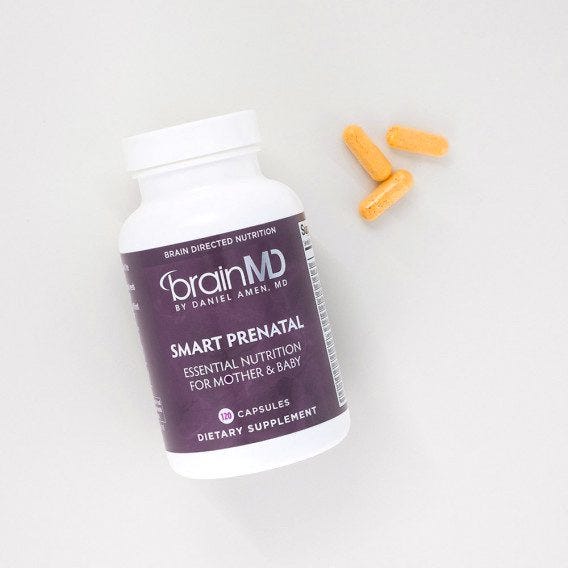Folic Acid vs. Folate: Everything You Need to Know
Did you know that there are 13 vitamins that are vital — essential — to your survival? Among them is the lineup of B vitamins with names like thiamin (for vitamin B1), riboflavin (vitamin B2), and niacin (vitamin B3). Then there’s folate, incredibly important for our health no matter our stage of life. The folate vitamin group is most active when converted into methylfolate (MF).
What is Folate?
Folate is a group of chemically complicated substances that supply the body with chemically simple methyl groups. The body needs folates but can’t make them from scratch and therefore must get from foods or dietary supplements. Folate is vital at every life stage, from early development in the womb through birth and all the way through adulthood. But for many people lifestyle factors, popularly used medications or common gene mutations deplete their folate stores. For these individuals AND for the rest of us, methylfolate is the best dietary form of folate.
Methylfolate (technically methyltetrahydrofolate) is the body’s most active form of folate. ALL our cells need MF to drive specialized enzymes that make the DNA, genes, and chromosomes. All our cells also need MF to repair damage to their DNA (which is occurring all the time, even in healthy cells). Methyl coming mainly from folate is also very important for epigenetics — turning genes on and off using methyl — as well as to enable cells to grow, maintain their structure and make new cells.
Our 200 billion brain cells need MF for all these reasons. But also, they need MF to enable them to make nerve cells’ electrical insulation, important neurotransmitters, even a major hormone. Yet MF is not commonly found in foods and very rarely provided by dietary supplements. BrainMD has made methylfolate a priority ingredient in our brain-directed dietary supplements.
Lifestyle, Medications Deplete the Body’s Folate Supply
The body’s stores of MF and other methyl resources are in danger of depletion by alcohol abuse, smoking, and by high usage of drugs such as antacids, antibiotics, painkillers, certain diuretics, estrogen replacement therapy, oral contraceptives, anticonvulsants, and SSRI psychotherapeutics. Poor diet, poor digestive and absorptive function, and suboptimal kidney function all can deplete the body’s folate stores.
During pregnancy, the demand for folate becomes greatly increased due to the needs of the developing baby. Supplementing with Methylfolate from BrainMD Health helps provide your brain and body with optimized folate, to improve your chances of maintaining health and well-being.
What’s the Difference Between Folate, Folic Acid, and Methylfolate?
Many foods are being “fortified” with folic acid (FA) to help consumers maintain good nutritional folate status. Also, dietary supplements that include folate typically provide it as FA. Yet this substance is a manufactured folate that is known to be poorly utilized by the body’s folate enzyme system. The body has to use an enzyme to make FA usable, and this enzyme’s conversion capacity is limited. Consequently, many people have unconverted FA in their bloodstream, which studies have linked to negative health effects.
Methylfolate is the folate form most naturally preferred by the body, so much so that the intestinal lining has “transport proteins” that bind to it and selectively absorb it into the blood. Similar proteins also move MF from the circulation into the brain tissue. But MF utilization can be blocked by the FA coming from fortified foods or poorly formulated dietary supplements. Folic acid is not just poorly effective — it actually interferes with the enzymes that are tasked with using MF and the other folates coming from our foods. Folic acid consumption is a serious health issue.
Bottom line: always choose supplements with methylfolate instead of folic acid.
Methylfolate Bypasses Common Folate Mutations
Unlike folic acid (FA), methylfolate, when consumed, does not have to be converted into active folate—being already the body’s most active folate form, it can be immediately used by our folate enzyme systems. One of the most common human gene mutations is the C677T mutation in the enzyme MTHFR (Methylene Tetrahydrofolate Reductase), whose function is to produce MF.
More than 40 percent of individuals in some ethnic groups have this mutation, which is associated with impaired folate utilization. Taking MF by mouth bypasses this mutation: as premade authentic MF it doesn’t need to be produced by MTHFR. For people with C677T or various other, less common MTHFR mutations MF is a health breakthrough!
What Are the Benefits of Methylfolate
Here are a few of the numerous health benefits of MF:
- Fundamental to the growth, renewal, and total functioning of our cells, tissues and organs.
- Clinically proven for healthy mood, memory and other cognitive functions, and behavior.
- Enhances the clinically proven mood benefits of SAMe (S-adenosylmethionine).
- Essential for the brain to make the key neurotransmitters serotonin, dopamine and norepinephrine.
- Promotes the brain’s healthy production of melatonin, our major sleep hormone.
- Enhances the body’s regulation of homocysteine, a potentially toxic human metabolic product.
- Promotes healthy pregnancy and birth outcomes.
Best Prenatal Vitamin With Methylfolate

Whether you’re pregnant or planning to have a baby, it’s vital that you get proper nutrition, and you especially have to ensure you’re getting sufficient usable folate. Getting MF from a state of the art prenatal supplement like Smart Prenatal helps ensure you can meet your growing baby’s nutritional needs — and yours, as well.

Crucial from the Beginning
Folate is the most researched nutrient for pregnancy, yet most prenatal vitamins and other multivitamins continue to provide synthetic folic acid. The methyl groups coming from the MF in Smart Prenatal is absolutely critical for the proper development of the baby’s heart AND nervous system AND all the other organs. Methyl from MF is needed from the moment of fertilization of the human egg, through the development of the brain, heart and other organs, to birth, and throughout a person’s lifetime.
Methylfolate Crucial After Pregnancy
After birth, MF continues to be extremely crucial for an infant’s development. As the mother’s body works at its utmost to maintain sufficient levels of breast milk, her methyl and folate reserves are in danger of becoming depleted, which makes both infant and mother vulnerable to all the problems that come with folate deficiency. By continuing to supplement with MF, which happens to be the predominant folate in breast milk, a mother can be confident she’s supporting her infant’s ongoing growth while protecting her own mood and well-being.
Smart Prenatal with MF avoids the uncertainties and limitations associated with the use of folic acid in prenatal supplements. Better nourished mothers have healthier babies with well-developed brains. Children of mothers who are well-nourished and breastfeed have substantially better chances for optimal health as they mature into adults.
FAQs About Methylfolate
1. Do I really need Methylfolate?
Yes, you need it, and way more than you need folic acid! And your brain really needs it! Clinical research has confirmed that taking MF as a supplement can effectively improve the brain and total body’s folate status, and especially promotes positive mood.
MF also promotes healthy memory, behavior, the entire range of healthy brain functions, and a huge array of functions in the bone marrow, liver, and other organs. MF is the best commercially available dietary supplement for correcting confirmed folate deficiency and for any other situation where folate supplementation is recommended.
2. How safe is Methylfolate? What is the recommended dosage range?
MF’s safety is well documented, and it has been used safely as a dietary supplement for many years, with remarkable success. In multiples such as BrainMD’s NeuroVite Plus, an effective dose of MF is 400 micrograms (mcg) and up. Higher doses are needed during pregnancy, so our Smart Prenatal supplies 1000 mcg per day.
People with mood challenges or with any of the known folate gene mutations can benefit from even higher amounts, and Methylfolate is very safe to take. BrainMD’s high-potency Methylfolate supplies 5000 mcg (5 milligrams) of MF. This level of daily dosing and higher has been proven safe from clinical research at Harvard and other research institutions. When under a physician’s supervision, up to 3 caps of Methylfolate (15 mg) can be taken daily without concern.
3. Will Methylfolate cause problems for those taking methotrexate?
We advise anyone taking methotrexate to consult a nutritionally-informed physician before taking Methylfolate.
4. Can vegans and vegetarians take Methylfolate?
Yes, it’s fully suitable for anyone not wanting exposure to animal-based foods or supplements.
5. Is Methylfolate compatible with other dietary supplements?
Yes, MF is very safe, very well tolerated and fully compatible with multiple vitamin/mineral supplements, fish oils, herbals, and other responsibly-formulated dietary supplements. Further, MF’s multiple methyl actions tend to reinforce the benefits of other dietary supplements. For example, taking MF along with BrainMD’s SAMe Mood & Movement 400 and Betaine TMG can make a big difference for maintaining a healthy mood.
Taking folate as Methyfolate is well-proven nutritional health insurance for mood, memory, the other cognitive functions, behavior, and overall brain and body health. For more information about Methylfolate, and our full line of brain-healthy supplements, visit us at BrainMD.




Hi, Has there been any research on Restless Leg Syndrome? I do take Ropinirole but would like to switch to a more natural form. Sometimes it’s worse than others. I take a variety of your Brain Vitamins but I’m not consistent so I’m not sure which one is really helping. I take the MTHF. I have one of the gene mutations. Thank you for any information.
How long when taking Methylfolate 15mg daily does it take to notice any improvements mentally?
I didn’t pay attention to the number of days but I felt an overall sense of well being in a week.
I have Mthfr homozygous. I also have COMT from both mom and dad. Would you recommend this supple for me?
Hi
Wow, that is amazing and thank you so much for sharing benefits of MethylFolate. It was very helpful information.
Hi….
Wow, that is amazing and thank you so much for sharing benefits of MethylFolate. It was very helpful information.
Wow, that is amazing and thank you so much for sharing benefits of MethylFolate. It was very helpful information.
I just read Nutrient Power by William Walsh which I highly recommend. I have a double MTHFR genetic disorder so I methylate at 50% of the average person. Methyl Folate supplementation has cured a 6 year long brain issue I’ve been dealing with. I believe mandatory Folic Acid supplementation is an issue that needs to be addressed – https://www.ncbi.nlm.nih.gov/pmc/articles/PMC3257747/. Could this be the cause of increased obesity, autism, cancer, Alzheimers, etc.?
Did you read the entire book Brad? I ask, because Walsh actually recommends folic acid to many of his patients, depending on his differing view that it CAN be used and SHOULD be in ‘overmethylators’. The man of course has no studies to back up his claims…
Folic acid was prescribed to me when I was pregnant. I trusted my doctor and then come to find I was pre-eclamptic (pre toxemic) at month 8. From the article above, we know that pre-eclampsia is due to low folate levels. I know that I likely have one MTHFR gene mutation and wonder just how much the folic acid supplementation had to do with it (age was another factor, I was 38 when pregnant).
So, I agree, the mandatory supplementation is a problem.
Thank you for this amazing article. I am studying nutrition and this week, in particular, we are learning about water soluable vitamins and folate is a big part of this weeks lecture. This is so clear and I am glad I found this.